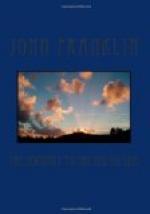On August 18th, the stormy weather and sea continuing, there was no prospect of our being able to embark. Dr. Richardson, Mr. Back, and I therefore set out on foot to discover whether the land within a day’s march inclined more to the east. We went from ten to twelve miles along the coast, which continued flat, and kept the same direction as the encampment. The most distant land we saw had the same bearing north-north-east, and appeared like two islands which we estimated to be six or seven miles off; the shore on their side seemingly tended more to the east so that it is probable Point Turnagain, for so this spot was named, forms the pitch of a low flat cape.
Augustus killed a deer in the afternoon but the men were not able to find it. The hunters found the burrows of a number of white foxes and Hepburn killed one of these animals, which proved excellent eating, equal to the young geese with which it was boiled and far superior to the lean deer we had upon the coast. Large flocks of geese passed over the tents flying to the southward. The lowest temperature today was 38 degrees.
Though it will appear from the chart that the position of Point Turnagain is only six degrees and a half to the east of the mouth of the Copper-Mine River, we sailed, in tracing the deeply-indented coast, five hundred and fifty-five geographical miles, which is little less than the direct distance between the Copper-Mine River and Repulse Bay, supposing the latter to be in the longitude assigned to it by Middleton.
When the many perplexing incidents which occurred during the survey of the coast are considered in connection with the shortness of the period during which operations of the kind can be carried on, and the distance we had to travel before we could gain a place of shelter for the winter, I trust it will be judged that we prosecuted the enterprise as far as was prudent and abandoned it only under a well-founded conviction that a farther advance would endanger the lives of the whole party and prevent the knowledge of what had been done from reaching England. The active assistance I received from the officers in contending with the fears of the men demands my warmest gratitude.
OBSERVATIONS ON THE PROBABILITY OF A NORTH-WEST PASSAGE.
Our researches, as far as they have gone, favour the opinion of those who contend for the practicability of a North-West Passage. The general line of coast probably runs east and west, nearly in the latitude assigned to Mackenzie’s River, the Sound into which Kotzebue entered, and Repulse Bay, and I think there is little doubt of a continued sea in or about that line of direction. The existence of whales too on this part of the coast, evidenced by the whalebone we found in Esquimaux Cove, may be considered as an argument for an open sea; and a connection with Hudson’s Bay is rendered more probable from the same kind of fish abounding on the coasts we visited, and on those




